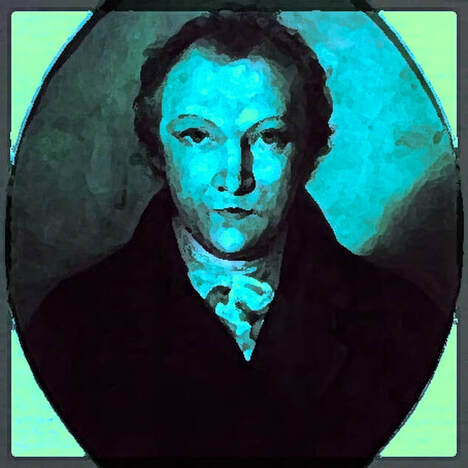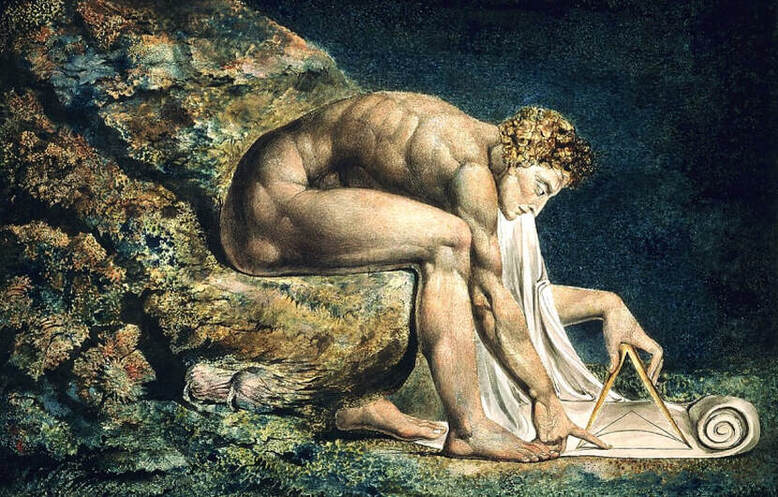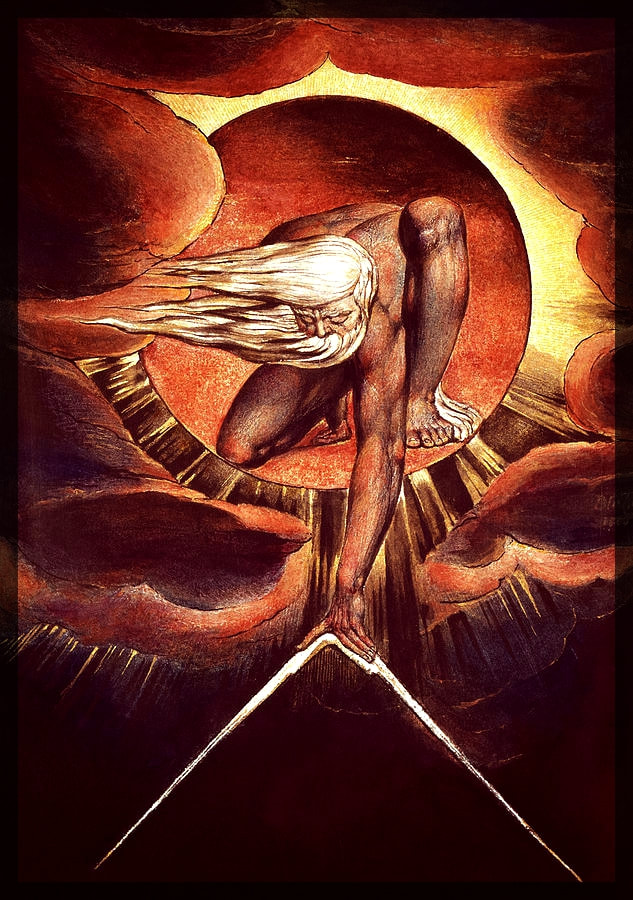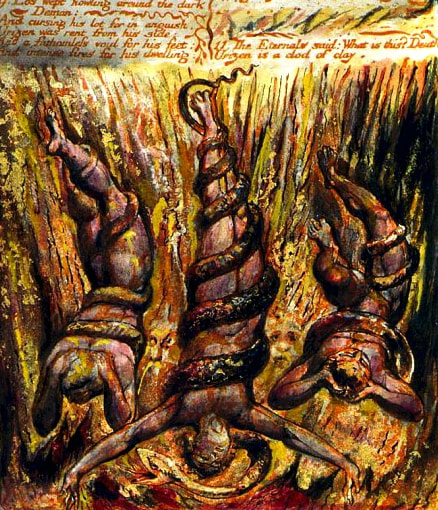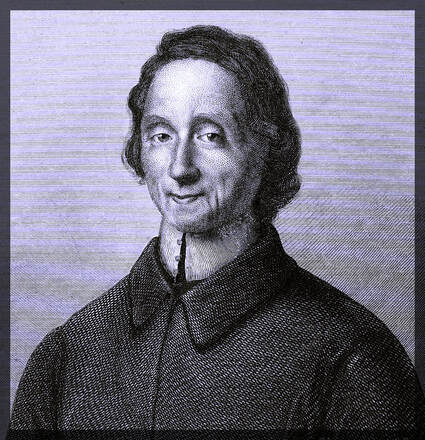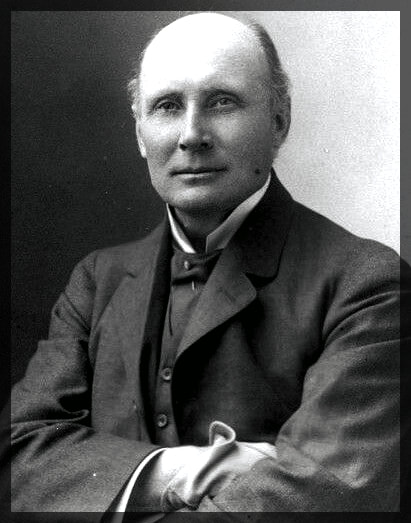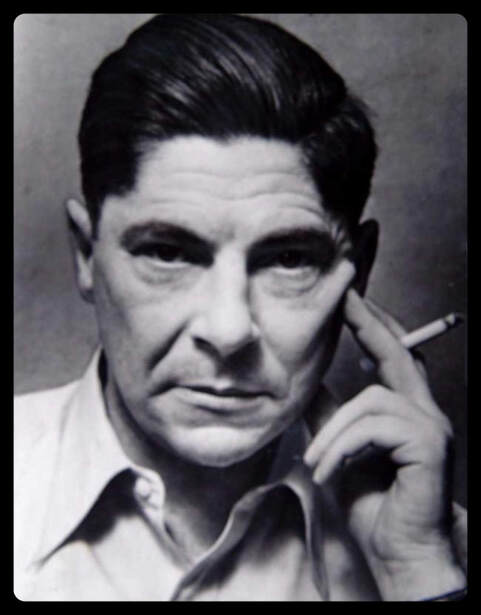Blake & the Materialists
.
by Michael Tsarion
|
|
The philosopher who wishes to understand the working of men's minds should always carefully consider the illusions which they live with - Gustave Le Bon
|
No man tried more vehemetly to combat the doctrines and dogma of Materialism than English poet William Blake. Like his predecessor, George Berkeley, he took on the absurdities purveyed by eminent thinkers Robert Boyle, Sir Francis Bacon, Sir Isaac Newton, John Locke, Thomas Hobbes, David Hume, and others.
It was no easy task, since their teachings had caught on like wildfire. Blake was not interested in defending the foolishness of religious dogma against the foolishness of Materialism. He despised religious dogma even more than that dispensed by Scientism. No! His duty was inspired by something beyond heady apologetics.
Indeed, Blake strongly opposed the prevailing religious outlook of his day - Deism. As far as he was concerned, if God exists, he's not the kind of being to set his universe in motion and then abscond for all eternity to a sunny beach beyond it. Blake's philosophy can be thought of as a kind of enriched Pantheism, or better still as Mystical Naturalism. In any case, later psychologists owe him an enormous debt.
Blake also grew to heavily criticize his one time mentor, the great Swedish philosopher and theologian Emanuel Swedenborg. Blake had many peeves against his former teacher, but chiefly objected to Swedenborg's supernaturalism. Let's keep the focus on humanity's existential dilemmas, thought Blake. What the angels get up to is interesting, but ultimately irrelevant.
It was no easy task, since their teachings had caught on like wildfire. Blake was not interested in defending the foolishness of religious dogma against the foolishness of Materialism. He despised religious dogma even more than that dispensed by Scientism. No! His duty was inspired by something beyond heady apologetics.
Indeed, Blake strongly opposed the prevailing religious outlook of his day - Deism. As far as he was concerned, if God exists, he's not the kind of being to set his universe in motion and then abscond for all eternity to a sunny beach beyond it. Blake's philosophy can be thought of as a kind of enriched Pantheism, or better still as Mystical Naturalism. In any case, later psychologists owe him an enormous debt.
Blake also grew to heavily criticize his one time mentor, the great Swedish philosopher and theologian Emanuel Swedenborg. Blake had many peeves against his former teacher, but chiefly objected to Swedenborg's supernaturalism. Let's keep the focus on humanity's existential dilemmas, thought Blake. What the angels get up to is interesting, but ultimately irrelevant.
|
|
Blake's prestigious predecessors: Irish non-Materialist philosopher George Berkeley (1685-1753), and Swedish theologian and mystic Emanuel Swedenborg (1688-1772). Once highly influenced by Swedenborg, Blake grew to renounce and ridicule many of his ideas. The university town of Berkeley, California was named after Bishop Berkeley. Sadly, despite its name, the university is a major bastion of Materialism. Berkeley is referred to as a Subjective Idealist. His beautiful philosophy has constantly been lampooned and misrepresented by later Materialists.
|
|
|
|
To Blake, mainstream English philosophy from Bacon through Stewart, marked the progressive degeneration of human thought - Sheila Spector
|
As a young man, Blake avidly supported many humanitarian causes. Early works, such as Songs of Innocence and Songs of Experience champion the struggles of the downtrodden and underprivileged. He supported early female rights movements and joined the fight against child-labor and slavery.
Blake tracked all the obscenities of life to underlying causes, particularly to a deeply erroneous kind of thinking. He also addressed errors in how we think about thought.
He filled his works with many allusions to mental folly, such as Newtonian Sleep, Mind-Forged Manacles, Single-Vision, Locke's Looms and Satanic Mills, etc. In one way or another he addressed the impaired thinking of minds subjugated by the dogma of Materialism and Scientism.
Blake also tracked deranged thought to the faustian will. He personified this phenomenon as an archonic giant called Urizen. The name is a clever pun on "Your Reason."
Blake tracked all the obscenities of life to underlying causes, particularly to a deeply erroneous kind of thinking. He also addressed errors in how we think about thought.
He filled his works with many allusions to mental folly, such as Newtonian Sleep, Mind-Forged Manacles, Single-Vision, Locke's Looms and Satanic Mills, etc. In one way or another he addressed the impaired thinking of minds subjugated by the dogma of Materialism and Scientism.
Blake also tracked deranged thought to the faustian will. He personified this phenomenon as an archonic giant called Urizen. The name is a clever pun on "Your Reason."
|
|
Newton's Sleep. by William Blake. Sir Isaac Newton, like other Physicalist thinkers, represented all that was wrong and absurd with the world for Blake. The great man sits in the sludge at the bottom or the abyss, working out some mathematical conundrum. He's at home in the gloom, along with the primitive life-forms around him. Blake epitomizes the spiritual darkness of the scientist and his environment. The very instrument Newton uses for calculation is that fashioned by Satan or, in Blake's peculiar iconography, the monstrous demiurge Urizen. The modern Materialist is likewise Urizen's captive, utterly hypnotized by his spells. In modern parlance, the problem lies with Left-Brain cognition and artifice of the faustian will.
|
|
In Blake's extraordinary epics, the great crimson tyrant Urizen dominates the creation, giving rise to the kind of thinking that steers the faustian will to produce what we see and experience. The Materialist is completely hypnotized by the spells of Urizen, as is the average theologian. Indeed, the fallen "Ancient of Days" is the artificer of both religion and science.
|
|
Urizen by William Blake. The great archon personifies the thinking which gives rise to the inhuman doctrine of Materialism. The great compass represents the will, which in order to exist and function must not only cleave the universe into warring polarities, but evade the truth about its own origin.
|
|
Urizen's vision and dominance is resisted by other forces or beings, but if and when they take charge, things barely improve. It's something of an Alice's kitchen, where sense is drowned out by a cacophony of howls and protestations from the warring "gods." Blake even diagnoses this phenomenon, showing that as far as the will is concerned, the prattle and argy-bargy serves the purpose of drowning out the deeper voice of truth, personified in some Prophetic Books as the Lady Jerusalem.
But what can we know about the numinous voice of the underlying reality? Where does it come from? Can it ever be "known" in any sense of the word? If not, why not?
Immanuel Kant, the great German thinker, was not so sure. Like Blake, he dedicated his time and energy to demarcating the limits of reason. Although the known world is charted by reason and logic, there's a reality beyond which does not appear to our senses. Strange to say, it remains unknowable due to the nature of the very limits which provide us with access to the knowable and known.
Given the limits of reason, and the reason's incapacity to reveal essences, it is perfectly sound, said Kant, to clip the wings of reason to make way for faith. The ears of religious men perked up immediately.
But what can we know about the numinous voice of the underlying reality? Where does it come from? Can it ever be "known" in any sense of the word? If not, why not?
Immanuel Kant, the great German thinker, was not so sure. Like Blake, he dedicated his time and energy to demarcating the limits of reason. Although the known world is charted by reason and logic, there's a reality beyond which does not appear to our senses. Strange to say, it remains unknowable due to the nature of the very limits which provide us with access to the knowable and known.
Given the limits of reason, and the reason's incapacity to reveal essences, it is perfectly sound, said Kant, to clip the wings of reason to make way for faith. The ears of religious men perked up immediately.
|
|
German philosopher Immanuel Kant (1724-1804) is classified as a Transcendental Idealist. He discovered that reality is not observed and experienced in its entirety. He did not mean that the unknown is only unknown in a temporary sense. Rather, there are aspects of reality that are quite literally unknowable. No amount of speculation or scientific investigation avails insight into them. For Kant, the "noumenal" realm is permanently beyond reason. It is unknowable to our minds due to the very dynamics and settings of mind. The very faculties allowing us to engage with reality also permanently inhibit access to the essence of reality. Both perception and conception reveal but also conceal the world and its essence. Many later thinkers attempted to tackle this controversial aspect of Kant's philosophy.
|
|
By lauding faith as a justifiable means of relating to the unknowable or "noumenal," Kant made way for religion, which had long been losing the war against science.
Like an ambassador, Kant brought scientists and theologians back to a common table. He reopened dialogue between the two contingents which had been antagonistic for centuries. The modern age took shape because of this act of reconciliation initiated by Kant, who can be regarded as one of the foremost fathers of modernity.
Blake was attentive to all of this, but saw the reconcilement between scientists and theologians as a dark day for the world. The world's foulest criminals and malefactors had just formed a monstrous conglomerate thanks to the hermit of Konigsberg.
This was not progress, said Blake. The situation was desparate and something had to be done. The delusions upon which scientism and theology rested had to be exposed before all.
Blake dedicated his life to the project. However, after his death, most of his works were deliberately burned by an associate. We are left with mere fragments of his corpus. Sparse as they are, they contain profound critiques of religion and materialism. Many later thinkers - men such as Owen Barfield and Carl Jung, etc - were inspired by Blake's idiosyncratic writings, poetry and artistic creations.
Like an ambassador, Kant brought scientists and theologians back to a common table. He reopened dialogue between the two contingents which had been antagonistic for centuries. The modern age took shape because of this act of reconciliation initiated by Kant, who can be regarded as one of the foremost fathers of modernity.
Blake was attentive to all of this, but saw the reconcilement between scientists and theologians as a dark day for the world. The world's foulest criminals and malefactors had just formed a monstrous conglomerate thanks to the hermit of Konigsberg.
This was not progress, said Blake. The situation was desparate and something had to be done. The delusions upon which scientism and theology rested had to be exposed before all.
Blake dedicated his life to the project. However, after his death, most of his works were deliberately burned by an associate. We are left with mere fragments of his corpus. Sparse as they are, they contain profound critiques of religion and materialism. Many later thinkers - men such as Owen Barfield and Carl Jung, etc - were inspired by Blake's idiosyncratic writings, poetry and artistic creations.
Image from Blake's Book of Urizen
|
|
The tree which moves some to tears of joy is in the eyes of others only a green thing that stands in the way. Some see in nature all ridicule and deformity...and some scarcely see nature at all. But to the eyes of the man of imagination, nature is imagination itself - William Blake
|
Blake's critiques of Materialism take on many forms. As an artist, he frequently championed the merits of imagination. This attitude was based in his search for the foundations of the will.
If all we see and experience is due to energy or will, certain puzzling questions arise. Does the will will itself? Is this even logical or possible? If not, what can be said of the source of will? Not much it seems.
If a Materialist points to food, we are bound to inquire into how a piece of food contains the energy needed for life. How did the piece of food, and the nutrients within it, get to be?
To look at any physical phenomenon is to espy the energy which brings it into being. It doesn't mean we get much further. Where do the suns get their energy? Even if we isolate a deeper physical source, strangely, the question about an ultimate origin remains. Blake pointed out that science hasn't bothered sincerely addressing this ontological problem. Instead, science has simply avoided it, focusing instead on the observable effects of energy.
Just as Kant left us with a world of "appearances" which we take for reality, so it is with scientific paradigms. Science successfully locates, measures, grades, classifies, compares and circumscribes the material world, putting what it discovers to practical use. But science knows nothing essential about the world it calibrates so expertly. The nature of energy, in itself, remains a mystery.
Right, said Blake! Why the hell then is science so committed to Materialism, given that a great impenetrable mystery lies at the base of all matter? Should they not be fixated on this oddity instead of making categorical statements about the non-existence of mind?
If all we see and experience is due to energy or will, certain puzzling questions arise. Does the will will itself? Is this even logical or possible? If not, what can be said of the source of will? Not much it seems.
If a Materialist points to food, we are bound to inquire into how a piece of food contains the energy needed for life. How did the piece of food, and the nutrients within it, get to be?
To look at any physical phenomenon is to espy the energy which brings it into being. It doesn't mean we get much further. Where do the suns get their energy? Even if we isolate a deeper physical source, strangely, the question about an ultimate origin remains. Blake pointed out that science hasn't bothered sincerely addressing this ontological problem. Instead, science has simply avoided it, focusing instead on the observable effects of energy.
Just as Kant left us with a world of "appearances" which we take for reality, so it is with scientific paradigms. Science successfully locates, measures, grades, classifies, compares and circumscribes the material world, putting what it discovers to practical use. But science knows nothing essential about the world it calibrates so expertly. The nature of energy, in itself, remains a mystery.
Right, said Blake! Why the hell then is science so committed to Materialism, given that a great impenetrable mystery lies at the base of all matter? Should they not be fixated on this oddity instead of making categorical statements about the non-existence of mind?
|
|
French philosopher Nicolas Malebranche (1638-1715). One more forgotten thinker whose insights devastate Materialism. His perceptive theories were finally reprised and updated in modern times by the great Alfred North Whitehead.
|
|
What questions do Materialists make their business? Why do they evade the great question? Blake saw through their chicanery, and attempts to divert attention by loudly refuting the arguments of non-materialists.
It began with Descartes, and was later reified into the so-called "Hard Problem." How do the mental and physical interact? Hardline Materialists declare that the question is unanswerable, which justifies their efforts to throw out the mental altogether.
It's business as usual from that point on. The Materialist turns to anyone speaking about mind and denies that such a thing exists. He cunningly provokes non-materialists to set off on a fool's errand, to bring back verifiable "proof" of their proposition. So it has gone on decade after decade. Blake saw through the tactic from the start.
...I'm not following your directives, dear Materialist. I have no intention of playing your game by your rules...
...I'm not concerned with proving the existence of mind for your edification. I'm only concerned with proving that you and your refutations against mind stand on philosophical quicksand...
...It is your understanding of reality that is constitutionally weak, and I mean to prove it, declared Blake.
Blake's argument runs along these lines: The Materialist's premise is knocked into a cocked-hat from the off.
His weakness is exposed as soon as he focuses not on the elusive mind's existence, but on the source of what he believes or "knows" actually exists. This is because what he does see and know isn't as certain as he pretends. In this sense, his demand for certaintly about "mind" is absolutely spurious.
It began with Descartes, and was later reified into the so-called "Hard Problem." How do the mental and physical interact? Hardline Materialists declare that the question is unanswerable, which justifies their efforts to throw out the mental altogether.
It's business as usual from that point on. The Materialist turns to anyone speaking about mind and denies that such a thing exists. He cunningly provokes non-materialists to set off on a fool's errand, to bring back verifiable "proof" of their proposition. So it has gone on decade after decade. Blake saw through the tactic from the start.
...I'm not following your directives, dear Materialist. I have no intention of playing your game by your rules...
...I'm not concerned with proving the existence of mind for your edification. I'm only concerned with proving that you and your refutations against mind stand on philosophical quicksand...
...It is your understanding of reality that is constitutionally weak, and I mean to prove it, declared Blake.
Blake's argument runs along these lines: The Materialist's premise is knocked into a cocked-hat from the off.
His weakness is exposed as soon as he focuses not on the elusive mind's existence, but on the source of what he believes or "knows" actually exists. This is because what he does see and know isn't as certain as he pretends. In this sense, his demand for certaintly about "mind" is absolutely spurious.
|
|
We have sought for firm ground and found none. The deeper we penetrate, the more restless becomes the universe; all is rushing about and vibrating in a wild dance - Max Born (Physicist)
|
If all things experiened and observed are made possible by energy, and if the origin of energy is unknown or unknowable, the case for Materialism immediately collapses.
|
|
English philosopher Alfred North Whitehead (1861-1947), was one of the greatest mathematicians in history. As such, he worked alongside Bertrand Russell on Principia Mathematica. He finally rejected Materialism and became an Idealist. Influenced chiefly by Schelling and Malebranche, he developed Process Philosophy.
|
|
The scientist and materialist must admit that what exists to be known and proven is little more than an effect of mysterious underlying causes. It follows that an effect has no way of probing into its own causes. There's no certainty there at all.
All that can be known is that things have been caused. Brain-function and the nervous system are effects. Human knowledge is also an effect. Therefore, why do Materialists base their denials on the existence of mere effects? It's preposterous. An effect can, by definition, only register, measure and know other effects, not their ultimate causes. The study of effects by that which is also an effect has its place and can proceed well enough. But let us not be fooled.
Blake faulted scientists and materialists for getting beyond themselves. The roots of the will and of energy lie in darkness. So what folly to set limits of any kind upon that mystery and its function. To do so is unwarranted and presumptuous. This act is what Blake referred to as ratio. In other words, it is the delimiting faculty of the reason which, as Kant showed, refuses to acknowledge the problems caused by its own reductive capacities.
All that can be known is that things have been caused. Brain-function and the nervous system are effects. Human knowledge is also an effect. Therefore, why do Materialists base their denials on the existence of mere effects? It's preposterous. An effect can, by definition, only register, measure and know other effects, not their ultimate causes. The study of effects by that which is also an effect has its place and can proceed well enough. But let us not be fooled.
Blake faulted scientists and materialists for getting beyond themselves. The roots of the will and of energy lie in darkness. So what folly to set limits of any kind upon that mystery and its function. To do so is unwarranted and presumptuous. This act is what Blake referred to as ratio. In other words, it is the delimiting faculty of the reason which, as Kant showed, refuses to acknowledge the problems caused by its own reductive capacities.
What animates the will?
|
|
To encounter the depths and rich complexity of the cosmos, we require ways of knowing that fully integrate the imagination, the aesthetic sensibility, moral and spiritual intuition, revelatory experience, symbolic perception, somatic and sensuous modes of understanding and empathic knowing - Richard Tarnas
|
Is it wrong to presume that the essence of being is purposeful? After all, as purposeful beings ourselves, it's quite logical to extend purpose to it. We rightly presume so as long as we concede that upper structures are not wholly able to grasp the secrets of their origin, and that there is something characteristic about the will's preference to not know too much about its ineffable source.
In this way Blake, like Berkeley before him, was able to cut the Materialist down to size. Concern yourself with the mystery at the root of your observable reality, was his admonition. It exists even though it can't be directly observed. Any questions?
Even if "mind" does exist, it does so only as an effect, same as that which is visible to the senses and brain. Saying that mind is an effect that can't be physically "seen," isn't a counter-argument at all, since the substratum of the observable cannot be physcally seen either. Hence, the arguments of the Materialist against the non-existence of mind are without warrant.
For this reason, there is no need to play the game of the Materialists. There's no need for anyone to waste energy proving them wrong about the existence of mind. Their own starting point is demonstrably wrong-footed. It is for them to admit that everything known and knowable - including the observing consciousness - is merely an effect of something completely mysterious.
To reduce or deny the underlying mystery is absurd. Given that it gives rise to the known and observable, it is more than likely capable of giving rise to something beyond the brain's registration. That one cannot physically observe it means little. In other words, it is quite possible for the mystery at the foundation of all effects, to cause another effect that eludes the capacities of the brain. It's merely a matter of spectrum, as in the cases of light, color and frequency. That niggardly Materialists cannot concede this fact reveals the lunacy and bankruptsy of their entire worldview.
Instead of being the source of enlightenment, they are, as Blake taught, the source of all ignorance.
In this way Blake, like Berkeley before him, was able to cut the Materialist down to size. Concern yourself with the mystery at the root of your observable reality, was his admonition. It exists even though it can't be directly observed. Any questions?
Even if "mind" does exist, it does so only as an effect, same as that which is visible to the senses and brain. Saying that mind is an effect that can't be physically "seen," isn't a counter-argument at all, since the substratum of the observable cannot be physcally seen either. Hence, the arguments of the Materialist against the non-existence of mind are without warrant.
For this reason, there is no need to play the game of the Materialists. There's no need for anyone to waste energy proving them wrong about the existence of mind. Their own starting point is demonstrably wrong-footed. It is for them to admit that everything known and knowable - including the observing consciousness - is merely an effect of something completely mysterious.
To reduce or deny the underlying mystery is absurd. Given that it gives rise to the known and observable, it is more than likely capable of giving rise to something beyond the brain's registration. That one cannot physically observe it means little. In other words, it is quite possible for the mystery at the foundation of all effects, to cause another effect that eludes the capacities of the brain. It's merely a matter of spectrum, as in the cases of light, color and frequency. That niggardly Materialists cannot concede this fact reveals the lunacy and bankruptsy of their entire worldview.
Instead of being the source of enlightenment, they are, as Blake taught, the source of all ignorance.
|
|
Why does man not see things as they are? Because he
is himself standing in the way: he conceals things - Friedrich Nietzsche |
For Blake, mind certainly exists, although it's better named "Imagination." There's not a scientist anywhere who doesn't rely on the power of the imagination. Author and philosopher Arthur Koestler provides numerous case-histories proving this point. In his masterly book Sleepwalkers, he discusses case after case of eminent scientists openly citing strange visionary flashes leading to major insights and breakthroughs. Blake didn't require supportive proofs of this kind, and neither should anyone else.
|
|
The brilliant novelist and scientist Arthur Koestler (1905-1983). His trilogy Sleepwalkers, Act of Creation and Ghost in the Machine, is a must for those exploring the chicanery and limits of reductionist science.
|
|
Blake advised his readers not to play the game of the Materialists. They formulate the problem as well as the rules by which it is to be negotiated and solved. Blake pulled the plug on their rotten strategy and threw it in their faces.
Let us remember to do the same. It's not a case of a Hard-Problem, but of hard-heads, closed minds, and the mystery they pretend doesn't exist.
Let us remember to do the same. It's not a case of a Hard-Problem, but of hard-heads, closed minds, and the mystery they pretend doesn't exist.
. . .
Michael Tsarion (2021)
